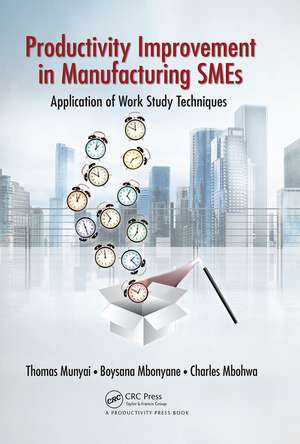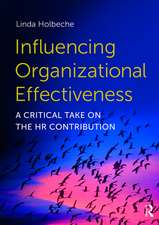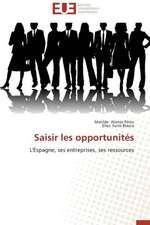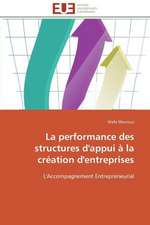Productivity Improvement in Manufacturing SMEs: Application of Work Study
Autor Thomas Thinandavha Munyai, Boysana Lephoi Mbonyane, Charles Mbohwaen Limba Engleză Paperback – 29 aug 2022
The challenge is that government from various countries in developing and underdeveloped countries, mandated agencies in their respective areas, to ensure that there is economic progress for these SMEs, but productivity remains low in the manufacturing SMEs. When SMEs do not perform well, productivity of manufacturing SMEs declines and unemployment increases. Thus, an increase in unemployment results in a drop of GDP in the country and can become a global and economic crisis. This book describes a process which enables the reader to use effective knowledge that addresses problems facing the productivity of manufacturing SMEs such as work study tools and case studies and provides solutions and applications to improve the running of the manufacturing SMEs in growing their productivity.
| Toate formatele și edițiile | Preț | Express |
|---|---|---|
| Paperback (1) | 225.52 lei 6-8 săpt. | |
| Taylor & Francis – 29 aug 2022 | 225.52 lei 6-8 săpt. | |
| Hardback (1) | 463.39 lei 6-8 săpt. | |
| Taylor & Francis – 19 dec 2017 | 463.39 lei 6-8 săpt. |
Preț: 225.52 lei
Preț vechi: 263.59 lei
-14% Nou
Puncte Express: 338
Preț estimativ în valută:
43.17€ • 46.90$ • 36.28£
43.17€ • 46.90$ • 36.28£
Carte tipărită la comandă
Livrare economică 21 aprilie-05 mai
Preluare comenzi: 021 569.72.76
Specificații
ISBN-13: 9781032402031
ISBN-10: 1032402032
Pagini: 374
Ilustrații: 22
Dimensiuni: 178 x 254 x 25 mm
Greutate: 0.92 kg
Ediția:1
Editura: Taylor & Francis
Colecția Productivity Press
Locul publicării:Oxford, United Kingdom
ISBN-10: 1032402032
Pagini: 374
Ilustrații: 22
Dimensiuni: 178 x 254 x 25 mm
Greutate: 0.92 kg
Ediția:1
Editura: Taylor & Francis
Colecția Productivity Press
Locul publicării:Oxford, United Kingdom
Public țintă
Professional Practice & DevelopmentCuprins
Preface; Chapter 1: The Background of Manufacturing SMEs; Chapter 2: Work Study and Productivity Theory: Groundwork Theories; Chapter 3: Effectiveness versus Efficiency in Manufacturing SMEs; Chapter 4: Factors Influencing Productivity in Manufacturing SMEs; Chapter 5: Identifying the Environment for Manufacturing SMEs; Chapter 6: Work Study (WS) Techniques: Method Study; Chapter 7: Work Study (WS) Techniques: Work Measurement; Chapter 8: The Impact of Work Study on Physical Capital in Relation to Productivity of Manufacturing SMEs; Chapter 9: The Impact of Work Study on Technological Capital in Relation toProductivity of Manufacturing SMEs; Chapter 10: The Impact of Management in Relation to Productivity to Manufacturing SMEs; Chapter 11: Work Study Report Writing; Chapter 12: Conclusions and Further Research; Appendices; References
Notă biografică
Thomas Munyai is the lecturer and Head of department in Operations Management at Tshwane University of Technology, Pretoria South Africa. Currently He is a Doctoral student in Engineering Management at University of Technology with main focus on development of model to empower small business to enhance productivity in South Africa. He hold and MBA from UNISA, BSc (Hons.) Mathematical Statistics (Wits university), and BSc. in mathematics and statistics (University of Limpopo). He has 20 years’ experience in manufacturing and food processing industry, as factory manager, operations manager, product and sales manager, procurement manager. His professional memberships include the South African Production and Inventory Control Society (SAPICS). His field of interest are optimization though linear and non-linear modelling, statistics, mathematics, process mapping modelling; information and technology and manufacturing technology.
Boysana Mbonyane is a senior lecturer in the Department of Operations Management at the University of South Africa, Pretoria, South Africa. Currently, he is a doctoral student in Engineering Management at the University of Johannesburg with a main focus on the development of a framework for efficiency in relation to physical and technological capital to yield continuous growth in small business in Gauteng, South Africa. He completed his master’s degree in Business Leadership in 2014 and a master of Technology degree in Business Administration in 2007 at the University of South Africa (UNISA). He also completed his BCom (hons) in Industrial Psychology at the University of Johannesburg in 2006 and a BTech in Business Administration in 1999 at the University of South Africa. His undergraduate qualifications are a national diploma in Organization and Work Study, completed in 1995 at Technikon Witwatersrand. He spent 10 years in the mining industry and 10 years as a lecturer at the University of Johannesburg. Boysana joined the University of South Africa, 01 February, 2010.
Charles Mbohwa is a Full Professor and Vice-Dean: Postgraduate Studies, Research and Innovation at University of Johannesburg's (UJ) Faculty of Engineering and the Built Environment (FEBE). He is a Project Leader of several initiative on renewable technology as well as projects on Platinum Group Metals and HFCT research project, South African and international collaboration. His research activities are in renewable energy sustainability. He has supervised HFCT Master and doctoral research studies in HFCT. He has supervised several post-graduate students. He has taken part in organising many International Conferences and has managed several research projects involving collaboration with partners in the USA, Brazil, China, Norway, United Kingdom, Germany, United Nation and with many African countries. He is an established researcher and professor in operations management, manufacturing systems, green supply chain management and sustainability engineering, optimization, and his specializations include renewable energy systems, and bio-fuel feasibility.
Boysana Mbonyane is a senior lecturer in the Department of Operations Management at the University of South Africa, Pretoria, South Africa. Currently, he is a doctoral student in Engineering Management at the University of Johannesburg with a main focus on the development of a framework for efficiency in relation to physical and technological capital to yield continuous growth in small business in Gauteng, South Africa. He completed his master’s degree in Business Leadership in 2014 and a master of Technology degree in Business Administration in 2007 at the University of South Africa (UNISA). He also completed his BCom (hons) in Industrial Psychology at the University of Johannesburg in 2006 and a BTech in Business Administration in 1999 at the University of South Africa. His undergraduate qualifications are a national diploma in Organization and Work Study, completed in 1995 at Technikon Witwatersrand. He spent 10 years in the mining industry and 10 years as a lecturer at the University of Johannesburg. Boysana joined the University of South Africa, 01 February, 2010.
Charles Mbohwa is a Full Professor and Vice-Dean: Postgraduate Studies, Research and Innovation at University of Johannesburg's (UJ) Faculty of Engineering and the Built Environment (FEBE). He is a Project Leader of several initiative on renewable technology as well as projects on Platinum Group Metals and HFCT research project, South African and international collaboration. His research activities are in renewable energy sustainability. He has supervised HFCT Master and doctoral research studies in HFCT. He has supervised several post-graduate students. He has taken part in organising many International Conferences and has managed several research projects involving collaboration with partners in the USA, Brazil, China, Norway, United Kingdom, Germany, United Nation and with many African countries. He is an established researcher and professor in operations management, manufacturing systems, green supply chain management and sustainability engineering, optimization, and his specializations include renewable energy systems, and bio-fuel feasibility.
Descriere
This book focuses on the application of workstudy in productivity of manufacturing SMEs locally and abroad and also explores various industrial problems which face manufacturing SMEs in developing and underdeveloped countries in the rest of the world.



















